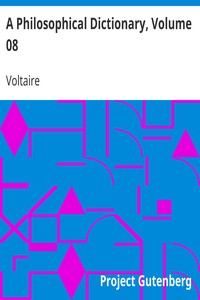A Philosophical Dictionary, Volume 08 by Voltaire
"A Philosophical Dictionary, Volume 08" by Voltaire is an encyclopedic dictionary published in 1764. This alphabetically arranged work criticizes religious institutions including the Roman Catholic Church, Judaism, and Islam, while advocating for tolerance and freedom of press. Born from a dinner party challenge at Frederick II's court, Voltaire created an affordable, pocket-sized text that educated and provoked simultaneously. Though the public embraced it enthusiastically, religious authorities condemned the work, burning copies in
town squares across Europe. (This is an automatically generated summary.)
Read or download for free
| Reading Options | Url | Size | |||
|---|---|---|---|---|---|
| Read now! | https://www.gutenberg.org/ebooks/35628.html.images | 481 kB | |||
| EPUB3 (E-readers incl. Send-to-Kindle) | https://www.gutenberg.org/ebooks/35628.epub3.images | 674 kB | |||
| EPUB (older E-readers) | https://www.gutenberg.org/ebooks/35628.epub.images | 679 kB | |||
| EPUB (no images, older E-readers) | https://www.gutenberg.org/ebooks/35628.epub.noimages | 250 kB | |||
| Kindle | https://www.gutenberg.org/ebooks/35628.kf8.images | 873 kB | |||
| older Kindles | https://www.gutenberg.org/ebooks/35628.kindle.images | 855 kB | |||
| Plain Text UTF-8 | https://www.gutenberg.org/ebooks/35628.txt.utf-8 | 456 kB | |||
| Download HTML (zip) | https://www.gutenberg.org/cache/epub/35628/pg35628-h.zip | 645 kB | |||
| There may be more files related to this item. | |||||
Similar Books
About this eBook
| Author | Voltaire, 1694-1778 |
|---|---|
| Commentator | Leigh, Oliver Herbrand Gordon |
| Commentator | Morley, John, 1838-1923 |
| Commentator | Smollett, T. (Tobias), 1721-1771 |
| Translator | Fleming, William F. |
| Title | A Philosophical Dictionary, Volume 08 |
| Note | Wikipedia page about this book: en.wikipedia.org/wiki/Dictionnaire_philosophique |
| Credits | Produced by Andrea Ball, Christine Bell & Marc D'Hooghe (From images generously made available by the Internet Archive.) |
| Reading Level | Reading ease score: 63.4 (8th & 9th grade). Neither easy nor difficult to read. |
| Language | English |
| LoC Class | B: Philosophy, Psychology, Religion |
| Subject | Philosophy -- Dictionaries |
| Subject | Criticism (Philosophy) |
| Category | Text |
| EBook-No. | 35628 |
| Release Date | Mar 28, 2011 |
| Most Recently Updated | Apr 3, 2024 |
| Copyright Status | Public domain in the USA. |
| Downloads | 880 downloads in the last 30 days. |
| Project Gutenberg eBooks are always free! | |

